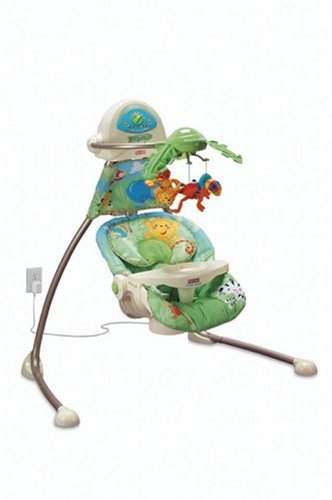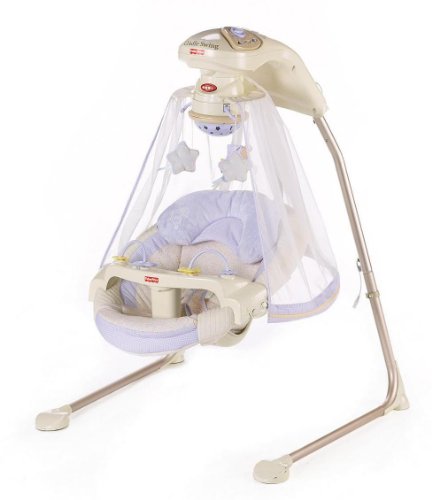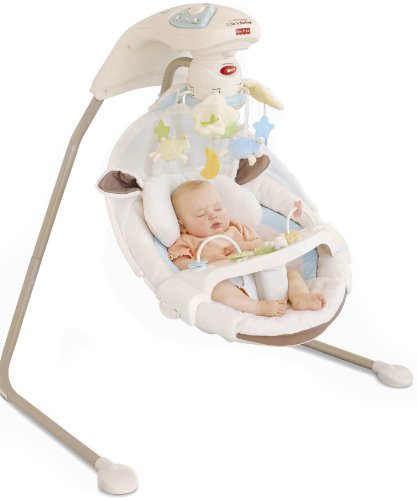Designed for indoor use, baby swings typically consist of a seat suspended by a pair of arms attached to a frame with wide-standing, tubular-metal legs. Swings come in windup and battery-operated models. To make a windup model swing, you crank a handle at the top or side of the frame, which provides 20 to 30 minutes of movement. Battery-operated swings are driven by a motor that generally uses four D batteries. Such models emit a low churning noise with each passage of the swing. Most of the swings on the market today are battery-operated.
With either a windup or battery-powered mechanism, swings are lightweight and can be easily moved from room to room, although some are more maneuverable than others. Standard-size swings eat up a fair amount of room, so they may not be for you if floor space is scarce.
Some parents of colicky babies swear by swings. Other parents say they get by just fine without one. You may find that a swing comes in handy if your baby needs to sleep in a semi-upright position due to a cold or stuffy nose (although a bouncer seat may do the trick as well).
SHOPPING SECRETS
Decide whether you want a windup or battery-operated swing.
A windup model may be perfectly adequate as long as it's stable and has a well-padded, reclining seat that affords easy access. Battery-operated models usually have a sleeker design plus more features, such as speed controls, baby-sound activation, and toys attached to a front play tray. However, many parents find the motors noisy. If possible, try display models in the store (with batteries) or double-check the store's return policy. Then, test the swing as soon as you get home so you'll have the option of taking it back within the time allowed.
Try your baby out in a friend's swing or bring baby to the store with you for test runs when you're shopping. Keep in mind that your baby may not like the motion of a swing at first, although that could change after a few tries. Your baby's reactions may help you decide on one brand over another, or whether you're even a candidate for a swing in the first place.
WHAT'S AVAILABLE
The major brands of baby swings are, in alphabetical order: Fisher-Price, Graco, J. Mason, and Kolcraft. Prices for windup swings range from to . The price range for battery-operated swings is to 0.
FEATURES TO CONSIDER
Crotch post. A built-in crotch post prevents a baby from sliding out of the seat--an extra safety measure. There should also be a safety belt, which most models have.
Frames. Swings without a top crossbar make it easier to put your baby in and take him or her out again. At the very least, look for a swing that has a wide, sturdy stance and folds or dismantles for storage.
Seat cover. Look for plush padding that's machine-washable.
Seat settings. Multiple reclining positions can help you find the most soothing posture for your baby, which is especially important if baby likes to nap while swinging (a common combo).
Speeds. Some battery-operated swings give you up to eight speeds, but more than four is overkill. The faster speeds may annoy rather than relax your baby.
Swinging motion. Some swings have two swinging motions: side to side and front to back. That's nice but not essential.
Timer. Some models feature a time-remaining indicator that can help you keep tabs on the action.
Toys. Many swings come equipped with toy bars or trays, which is an option your baby may enjoy. But make sure they're within reach so your baby can actually touch them. Also check that they're safely attached and have no small parts that might cause choking.
Nice but not necessary extras include a front tray, with or without attached toys; sound (classical music and lullabies), which may or may not be soothing to little ones and grown-ups; a light display; storage baskets on the side to hold toys and accessories; and a remote control to activate the swinging action, music, or both. Some swings try to sense when baby needs comforting and respond automatically. A built-in sound sensor "hears" baby's sounds and responds by swinging and/or playing music.
RECOMMENDATIONS
Look for a swing that has a sturdy, stable frame with strong posts and legs as well as a wide stance to prevent tipping. The bottom of the legs or frame should not protrude so far that you're likely to trip over them, however. Examine the seat. It should be well padded and have a crotch post (if it's not a travel version) to prevent your baby from sliding out. It should also offer a partially reclined position for snoozing. You'll also want a secure safety belt.
If you buy a model with a cradle or bassinet attachment, make sure it's well mounted underneath, with no potential for breaking loose. If you opt for a battery-operated swing, come equipped with four C or D cell batteries to test products in the store and hear the sound of the motor (a deal-killer for many parents). As a rule, swings don't come with batteries included.
Copyright © 2002-2006 Consumers Union of U.S., Inc.
For the latest information on this and many other products and services, visit http://www.ConsumerReports.org
 | Price : $88.00
| Price : $88.00













